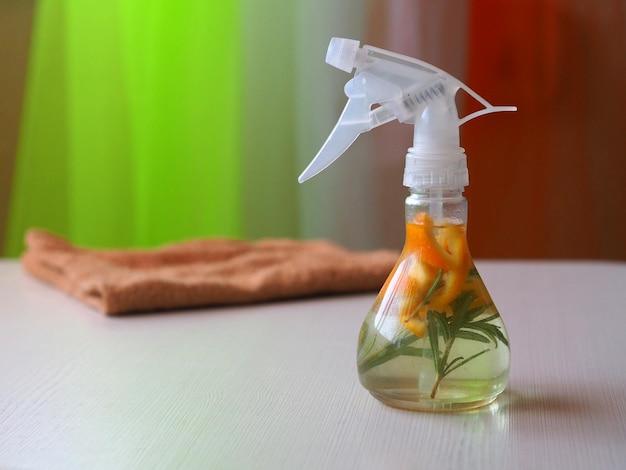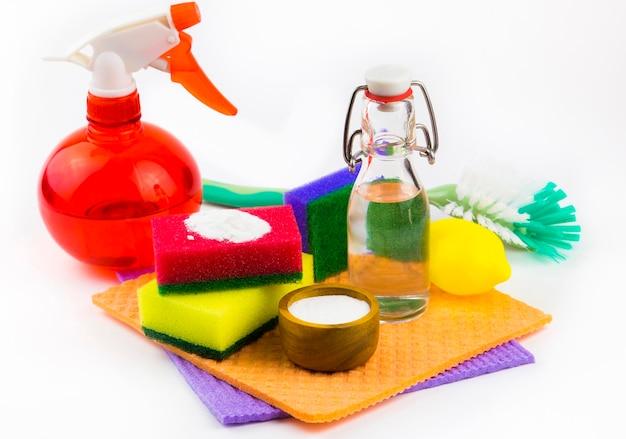Cleaning our homes is an essential part of maintaining a healthy and hygienic environment. Two common cleaning agents that many of us have in our cupboards are bleach and vinegar. Bleach is known for its powerful disinfecting properties, while vinegar is a versatile and eco-friendly cleaning solution. But what happens if we use them together or consecutively? How long should we wait between using bleach and vinegar? In this blog post, we will answer these questions and provide you with some valuable insights to help you clean effectively and safely.
When it comes to using bleach and vinegar, it’s essential to understand the potential chemical reactions that can occur. Mixing bleach and vinegar directly can produce toxic chlorine gas, which is harmful when inhaled. Therefore, it’s crucial to never combine these two cleaning agents in the same container or use them simultaneously. However, using vinegar after cleaning with bleach is generally safe, but it’s essential to allow enough time for the bleach to dissipate completely before using vinegar.
Throughout this article, we will delve into the details of how bleach and vinegar interact, the recommended waiting time between using them, and other helpful tips to ensure you can use these cleaning agents effectively without compromising your safety or the effectiveness of your cleaning routine. So let’s dive in and explore the right ways to utilize bleach and vinegar for a clean and healthy home.
How Long After Cleaning with Bleach Can I Use Vinegar
We’ve all been there – tackling a cleaning project and wondering which products we can safely combine. If you’ve recently used bleach to clean, you might be wondering how long you need to wait before using vinegar. Don’t worry, we’ve got the answers for you.
Understanding the Chemistry
Before we dive into the time frame, let’s take a quick look at the science behind these powerful cleaning agents. Bleach is a powerful disinfectant that contains chlorine, while vinegar is an acidic solution of acetic acid. When the two substances come into contact, they create a reaction that releases chlorine gas, which can be harmful if inhaled.
Give it Time to Disperse
To ensure your safety, it’s crucial to allow enough time for any residual chlorine gas to disperse before using vinegar. While there is no exact time frame that applies to all scenarios, it’s generally recommended to wait at least 24 hours after cleaning with bleach before using vinegar.
Ventilation is Key
While waiting for the chlorine gas to dissipate, make sure to keep the area well-ventilated. Open windows, turn on fans, and let the fresh air circulate. This will help speed up the process and minimize any potential risks.
A Sensible Approach
If you’re unsure about the safety of using vinegar after cleaning with bleach, it’s always best to err on the side of caution. Remember, cleaning should be a careful and responsible practice. Avoid potentially dangerous chemical reactions and protect yourself by giving it ample time.
Alternative Cleaning Solutions
If you’re in a pinch and can’t wait the recommended waiting period, there are alternative cleaning solutions you can use. Consider using a mild soap or a hydrogen peroxide-based cleaner instead. These options are safer to combine and can still deliver effective results.
Embrace the Power of Vinegar
Now that you know how long to wait before using vinegar after cleaning with bleach, you can confidently incorporate this versatile ingredient into your cleaning routine. Vinegar has many beneficial properties, such as being a natural disinfectant, deodorizer, and cleaner. Plus, it’s budget-friendly and eco-friendly!
In conclusion, after cleaning with bleach, it’s best to wait at least 24 hours before using vinegar to avoid any potential safety risks. Be patient, keep the area well-ventilated, and consider using alternative cleaning solutions if you’re in a rush. With these tips in mind, you can safely harness the power of vinegar to conquer your cleaning challenges. Happy cleaning!
Disclaimer: This article is for informational purposes only and should not be considered as professional advice. Always follow product-specific instructions and exercise caution when mixing cleaning agents.
FAQs About Using Vinegar After Cleaning with Bleach
White vinegar is a versatile household product known for its cleaning properties. But if you’ve recently used bleach to clean, you might be wondering how long you should wait before utilizing vinegar. In this FAQ-style guide, we’ll answer your burning questions and shed light on the topic. So grab a cup of tea (or vinegar!) and let’s dive in!
1. Does White Vinegar Evaporate Completely
Yes, white vinegar evaporates completely! So, if you’re worried about any lingering vinegar odor after using it on your freshly cleaned surfaces, fret not. Give it some time, and that pungent smell will dissipate, leaving your home smelling fresh and clean.
2. Is Distilled Vinegar the Same as White Vinegar
Absolutely! Distilled vinegar and white vinegar are just two names for the same thing. They both have the same acidic properties that make vinegar an excellent cleaning agent.
3. Does Vinegar Cancel Out Bleach
No, vinegar doesn’t cancel out bleach. In fact, combining vinegar and bleach can create harmful fumes, such as chlorine gas, which can be dangerous if inhaled. It’s best to avoid mixing these two powerful cleaning agents and use them separately.
4. Does Bleach React with Vinegar and Baking Soda
Yes, mixing bleach with both vinegar and baking soda can cause a reaction. It’s important to remember that bleach is a strong oxidizing agent, and when combined with other substances, it can produce harmful gases or even explosions. To ensure safety, it’s best to use bleach on its own and vinegar or baking soda separately for cleaning purposes.
5. How Long Does It Take Bleach to Dissipate
The time it takes for bleach to dissipate depends on various factors such as ventilation and surface porosity. Generally, bleach will start to dissipate within a couple of hours. However, it’s always a good idea to ensure proper airflow in the area to help speed up the process.
6. What Does White Vinegar and Bleach Do
White vinegar and bleach have distinct properties. While bleach is a powerful disinfectant and whitening agent, vinegar is known for its acidic composition, making it effective against mold, mildew, and certain bacteria. However, as previously mentioned, they should be used separately to avoid any unwanted chemical reactions.
7. How Long Does Bleach Last on Surfaces
When using bleach as a disinfectant, it’s essential to note that its effectiveness decreases over time. As bleach breaks down, it loses its disinfecting power. Generally, it is recommended to use bleach within 24 hours after dilution for optimal results.
8. Does Vinegar Expire
Vinegar has an impressively long shelf life and does not go bad per se. However, its quality can deteriorate over time, leading to a weaker cleaning capacity. To ensure its effectiveness, it’s best to use vinegar within one to two years of purchase.
9. Can I Leave Vinegar on Mold Overnight
Indeed, you can leave vinegar on mold overnight! In fact, allowing vinegar to sit on moldy surfaces for an extended period can increase its effectiveness. Remember, ventilation plays a crucial role, so ensure adequate airflow while treating mold.
10. Does Vinegar Evaporate Quickly
Vinegar has a relatively rapid evaporation rate. Its high acidity and low pH level contribute to its quick evaporation properties, making it an excellent choice for cleaning tasks where you want surfaces to dry swiftly.
11. Does Bleach Need to Be Rinsed Off
Yes, it’s crucial to rinse off bleach after cleaning. Although bleach can effectively disinfect surfaces, leaving it on for too long can damage certain materials. Always follow proper dilution instructions and rinse the area thoroughly with water after using bleach.
12. What Kills Mold Better: Bleach or Vinegar
Both bleach and vinegar are effective at killing mold, but they each have their strengths. Bleach, with its strong disinfecting properties, can eradicate mold from hard surfaces. On the other hand, vinegar is excellent for tackling non-porous surfaces and preventing mold growth in the future.
13. Can You Use Vinegar After Bleach Dries
Yes, once bleach has dried, using vinegar is safe. Since the two chemicals won’t mix or react when applied separately at different times, you can confidently employ vinegar to continue your cleaning routine.
14. How Does Vinegar and Bleach Work as a Disinfectant
Individually, vinegar and bleach have disinfectant properties. Vinegar’s acidity helps eliminate certain bacteria and mold, while bleach’s powerful oxidizing agents target a broader spectrum of microorganisms. However, to ensure their effectiveness, it’s best to use them separately and not combine them.
15. Is Bleach Still Active After Drying
Once bleach has dried, its disinfecting properties diminish significantly. It’s essential to keep this in mind when using bleach for disinfection purposes. For the best results, apply bleach, let it sit for the recommended time, then rinse it off and allow the surface to dry.
16. How Long Do You Have to Wait to Use Vinegar After Using Bleach
To be on the safe side and avoid any chemical reactions, it’s best to wait at least 24 hours before using vinegar after using bleach for cleaning. Giving ample resting time between the two cleaning agents ensures optimum effectiveness and safety.
17. What Kind of Vinegar Kills Mold
White vinegar is the go-to vinegar for killing mold. Its acidic nature makes it an effective mold-fighting agent. Simply place the vinegar in a spray bottle and apply it to the affected areas, then let it sit for some time before wiping away the mold.
18. How Long Does It Take for Vinegar Smell to Go Away
The vinegar smell will usually dissipate within a few hours. However, depending on factors such as ventilation and the amount of vinegar used, it may take up to a couple of days for the smell to completely vanish. Opening windows and utilizing fans can help expedite the process.
Having answered these frequently asked questions about using vinegar after cleaning with bleach, you now have the knowledge to embark on your cleaning adventures with confidence. Remember, bleach and vinegar are both potent cleaners, but they work best separately. Stay safe, keep your home clean and fresh, and happy cleaning!

